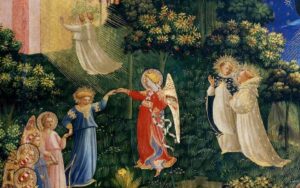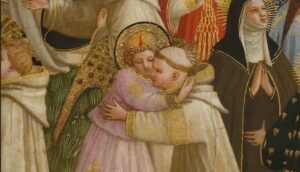Fourth Sunday after Easter
A few days ago, the Holy Father, in a discourse to the Diplomatic Corps, reminded us that “the Church can never be exempted from speaking the truth about humanity and the world, resorting whenever necessary to blunt language that may initially create misunderstanding. Yet truth can never be separated from charity, .… From the Christian perspective, truth is not the affirmation of abstract and disembodied principles, but an encounter with the person of Christ himself… Truth, then, does not create division, but rather enables us to confront all the more resolutely the challenges of our time”. That “blunt language” – which incidentally, we have not heard for over a decade –is none other than the language of the Natural Law and the Gospel which, while challenging us to come out of our egotism, is destined to set us free to become saints.
Blunt truths are destined to lead us to true joys; this is precisely what today’s oration tells us. In it, we ask for the grace to love what God commands and to long for what He promises in such a way that among all the changing and challenging realities of this brief life, our hearts may already be fixed and firm where the true joys are to be found, in the Triune God. In this life, there are occasional joys. Most of them don’t really deserve the name, however, because more often than not, we rejoice for the wrong reasons, and even the sweetest and purest of them are tempered by the knowledge that they will end. The perfect marriage will end; the dream house we will have to leave; the ideal job will one day no longer be possible, etc. Because of this, one cannot properly call those joys true, for true joy is unending, being a fruit of the Holy Spirit Himself. The grace this magnificent oration is asking for, then, is that our hearts be not ensnared by any passing attraction, lest it lose those goods that are eternal.
In today’s epistle, St James gives us deeper insight into those true joys when he tells us: Every best gift, and every perfect gift, is from above, coming down from the Father of lights, with whom there is no change, nor shadow of alteration (James 1:17). All good things come to us from above, like the rays of sun coming from the sun. In this life, it often takes some effort to see this, but all will be clear in eternity. Every single instant of our lives, like every instant of the history of the world, has been a time of grace, a time of mercy, destined to lead us to the unending joys of paradise. Here below, we have our moments of darkness; there, the Lamb himself will be our eternal light, as St John tells us in his magnificent vision of the heavenly Jerusalem: The city hath no need of the sun, nor of the moon, to shine in it. For the glory of God hath enlightened it, and the Lamb is the lamp thereof (Ap 21:23).
In His infinite mercy, the Lord does allow us to taste true spiritual consolation for a few brief moments. For those who are really intent on the interior life, this joy can be quite intense, to the point that we would like it to last forever, much like the apostles on Mount Tabor. This, however, is neither possible nor expedient. As Our Lord tells us in today’s Gospel: Now I go to Him that sent me..: It is expedient to you that I go: for if I go not, the Paraclete will not come to you; but if I go, I will send Him to you (Jn 16:5-7). He seems to be saying that the apostles had grown overly attached to His visible presence to the point that they were not focused enough on their mission. The visible disappearance of Our Lord is required, a sort of weaning from the sweetness of being with Him so that the Holy Ghost can come and lead them to the heights of sanctity. This is a common trait that we see in the lives of the saints. After having tasted and seen how good the Lord is (cf. Psalm 33), there comes the trial, the night, during which the saint does not give up and turn back but rather grows, digging deep roots in the virtues of humility and abandonment to Divine Providence who leads us through the valley of the shadow of death to the Kingdom of eternal light.

In the Gospel, Our Blessed Lord tells us that the promised Paraclete – that is, the Holy Ghost –will convince the world of sin, and of justice, and of judgment. Of sin: because they believed not in me. And of justice: because I go to the Father; and you shall see me no longer. And of judgment: because the prince of this world is already judged (Jn 16:8-11). What do these mysterious words signify? They are, in fact, a summary of all that the Holy Spirit does in the world. He convicts of sin those who refuse to believe, that is to say, by means of inspiration; He invites them to repent and receive the forgiveness that is offered through the Passion and Resurrection of Our Lord. He convicts of justice those who accept His gift of grace and are justified by the sacraments, going from virtue to virtue in the house of God, climbing the steep path to sanctity and thus spreading true justice and holiness throughout the world and throughout the ages. Finally, he convicts of judgment those who, like Satan, have definitively rejected God’s grace, as Our Lord had said earlier: He that believeth in the Son, hath life everlasting; but he that believeth not the Son, shall not see life; but the wrath of God abideth on him (Jn 3:36).
So, all these sacred texts of today’s liturgy speak the same truth, and they show us the way. Our task is clear: we must allow the grace of the Holy Spirit to transform us from the inside, leading us to true sanctity and making us His instruments to reach as many other souls as possible while we have the time. It is a daunting task, which is precisely why we have received the Holy Spirit in Baptism and Confirmation. There are many things it takes us time to understand and many things we cannot bear now, but the Spirit of Truth knows when and how to get them across to us. What is crucial is that we never turn back when we meet with opposition or are beset by discouragement but that we stand our ground and remain open to the guidance of the Spirit, for then we will learn all the truth that we need to know in this life and will be led to the fulness of truth and joy in the eternal kingdom.
We can thus see that the whole of Eastertide is meant to give us, through the sacred liturgy, a taste of the heavenly joys to which we are called. Just as Lent is the liturgical image of our life here below in the travail of tears and sorrows, so Eastertide ushers us, as it were, into the joys of our heavenly home and gives us a foretaste of them. We can imagine ourselves somewhat like St John in the Apocalypse as his heavenly visions commence: I looked, and behold a door was opened in heaven, and the first voice which I heard, as it were, of a trumpet speaking with me, said: Come up hither, and I will shew thee the things which must be done hereafter (Apocalypse 4:1). A door is opened, and we get a glimpse of the joys of a blessed eternity with God. For now, we can only enter through faith and the interior life. It all begins with those blunt truths that the Church preaches, which sometimes hurt when we hear them, but if we receive them, they slowly transform us, and we learn, step by step, to walk in the way of truth towards the true joys of eternal bliss.
.

